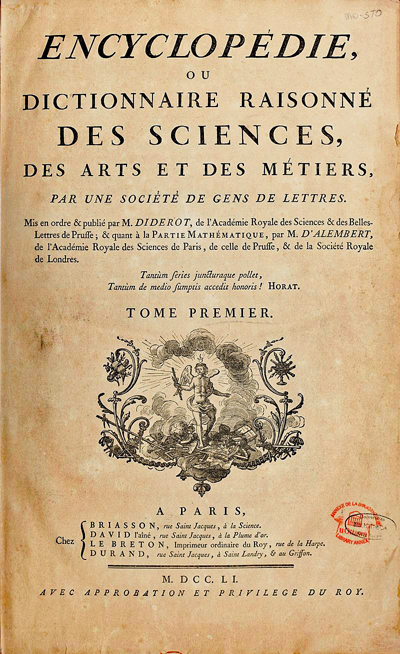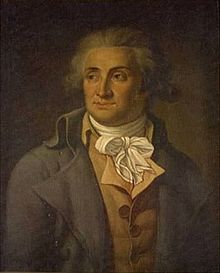Day 14 -- Condorcet, Sketch for a Historical Picture of the Human Mind (1793)
|
The MARQUIS de CONDORCET, (1743-1794), was a French mathematician,
[NB – As a practitioner of 18th century rhetoric,
Condorcet liked long sentences and rhetorical questions.
But there is no question that he thought that the
Enlightenment would lead to a new era of peace, prosperity, and
progress for all humanity.] |
 How
consoling for the philosopher who laments the errors, the crimes, the
injustices which still pollute the earth and of which he is often the victim
is this view of the human race, emancipated from its shackles, released from
the empire of fate and from that of the enemies of its progress, advancing
with a firm and sure step along the path of truth, virtue and happiness!
It is the contemplation of this prospect that rewards him for all his
efforts to assist the progress of reason and the defense of liberty. . . .
Such contemplation is for him an asylum, in which the memory of his
persecutors cannot pursue him; there he lives in thought with man restored
to his natural rights and dignity . . . .
How
consoling for the philosopher who laments the errors, the crimes, the
injustices which still pollute the earth and of which he is often the victim
is this view of the human race, emancipated from its shackles, released from
the empire of fate and from that of the enemies of its progress, advancing
with a firm and sure step along the path of truth, virtue and happiness!
It is the contemplation of this prospect that rewards him for all his
efforts to assist the progress of reason and the defense of liberty. . . .
Such contemplation is for him an asylum, in which the memory of his
persecutors cannot pursue him; there he lives in thought with man restored
to his natural rights and dignity . . . .
Our hope for the future condition of the human race
can be subsumed under three important heads: the abolition of inequality
among nations, the progress of equality within each nation, and the true
perfection of mankind. Will all
nations one day attain that state of civilization which the most
enlightened, the freest, and the least burdened by prejudices, such as the
French and the Anglo-Americans, have attained already?
Will the vast gulf that separates these peoples from the slavery of
nations under the rule of monarchs, from the barbarism of African tribes,
from the ignorance of savages, little by little disappear?
Is there on the face of the earth a nation whose
inhabitants have been debarred by nature herself from the enjoyment of
freedom and the exercise of reason?
Are those differences which have hitherto been seen
in every civilized country in respect of the enlightenment, the resources,
and the wealth enjoyed by the different classes into which it is divided, is
that inequality between men which was aggravated or perhaps produced by the
earliest progress of society, are these part of civilization itself, or are
they due to the present imperfections of the social art? Will they
necessarily decrease and ultimately make way for a real equality, the final
end of the social art, in which even the effects of the natural differences
between men will be mitigated and the only kind of inequality to persist
will be that which is in the interests of all and which favours the progress
of civilization, of education, and of industry, without entailing either
poverty, humiliation, or dependence? In other words, will men approach a
condition in which everyone will have the knowledge necessary to conduct
himself in the ordinary affairs of life, according to the light of his own
reason, to preserve his mind free from prejudice, to understand his rights
and to exercise them in accordance with his conscience and his creed; in
which everyone will become able, through the development of his faculties,
to find the means of providing for his needs; and in which at last misery
and folly will be the exception, and no longer the habitual lot of a section
of society?
Is the human race to better itself, either by
discoveries in the sciences and the arts, and so in the means to individual
welfare and general prosperity; or by progress in the principles of conduct
or practical morality; or by a true perfection of the intellectual, moral,
or physical faculties of man, an improvement which may result from a
perfection either of the instruments used to heighten the intensity of these
faculties and to direct their use or of the natural constitution of man?
In answering these three questions we shall find in
the experience of the past, in the observation of the progress that the
sciences and civilization have already made, in the analysis of the progress
of the human mind and of the development of its faculties, the strongest
reason for believing that nature has set no limit to the realization of our
hopes .
If we glance at the state of the world today we see
first of all that in Europe the principles of the French constitution are
already those of all enlightened men. We see them too widely propagated, too
seriously professed, for priests and despots to prevent their gradual
penetration even into the hovels of the slaves; there they will soon awaken
in these slaves the remnants of their common sense and inspire them with
that smouldering indignation which not even constant humiliation and fear
can smother in the soul of the oppressed. . . .
Can we doubt that either common sense or the
senseless discords of European nations will add to the effects of the slow
but inexorable progress of their colonies, and will soon bring about the
independence of the New World.? And then will not the European population in
these colonies. spreading rapidly over that enormous land, either civilize
or peacefully remove the savage nations who still inhabit vast tracts of its
land ? . . .
These vast lands are inhabited partly by large
tribes who need only assistance from us to become civilized, who wait only
to find brothers amongst the European nations to become their friends and
pupils; partly by races oppressed by sacred despots or dull-witted
conquerors, and who for so many centuries have cried out to be liberated . .
.
The time will therefore come when the sun will shine
only on free men who know no other master but their reason ; when tyrants
and slaves, priests and their stupid or hypocritical instruments will exist
only in works of history and on the stage . . .
 economist, publicist, and philosopher, who represented the
Enlghtenment at its most optimistic.
economist, publicist, and philosopher, who represented the
Enlghtenment at its most optimistic.